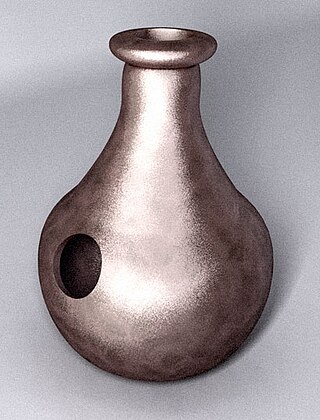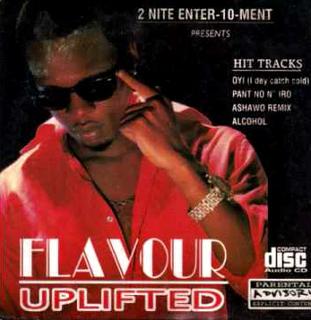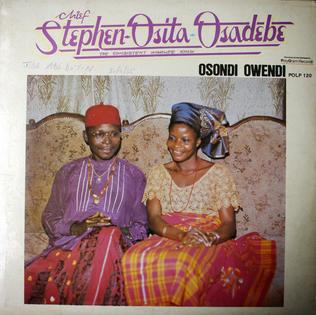
Igbo music is the music of the Igbo people, who are indigenous to the southeastern part of Nigeria. The Igbo traditionally rely heavily on percussion instruments such as the drum and the gong, which are popular because of their innate ability to provide a diverse array of tempo, sound, and pitch. Igbo music is generally lively, upbeat, and spontaneous which creates a variety of sounds that enables the Igbo people to incorporate music into almost all the facets of their daily lives. Some very popular Igbo musical styles are Igbo highlife, Ogene, Igbo gospel.
Christogonus Ezebuiro Obinna, alias Dr. Sir Warrior, also known as Ultimate Dr. Sir Warrior was a Nigerian Igbo highlife musician, guitarist and bandleader. A musical prodigy, he was one of the pioneers of highlife music in Nigeria and was the leader of the Oriental Brothers International Band which was famous in the Nigerian Igbo highlife music scene for several decades. He performed primarily in Nigeria, as well as performing internationally in places such as London and the United States of America with his crew.

Chief Stephen Osita Osadebe, often referred to as just Osita Osadebe, was a Nigerian Igbo highlife musician from Atani. During his career spanning over four decades, he became one of the best known musicians of Igbo highlife. His best-known hit was the 1984 single "Osondi Owendi", which established him as a leader in the highlife genre and was one of Nigeria's most popular records ever.

Chinedu Okoli, better known by his stage name Flavour N'abania or simply Flavour, is a Nigerian singer. He began his musical career as a drummer for a local church. Flavour is popularly known across Africa and the world for his hit song "Nwa Baby ". He is currently signed to 2nite Entertainment.

Uplifted is the second studio album by Nigerian singer Flavour N'abania. It was released on July 20, 2010, by Obaino Music and 2nite Entertainment. The album features guest appearances from Jay Dey, Oloye, Stormrex, Waga Gee, Asemstone, M-Jay, V.I.P and Elense. Uplifted was supported by the singles "Nwa Baby", "Oyi ", "Adamma" and "Odiro Easy".

Chibuzo Nelson Azubuike Ezege, who is known professionally as Phyno, is a Nigerian rapper, singer, songwriter and record producer. Phyno was born and raised in Enugu State but is a native of Anambra State. He started his music career as a producer in 2003 and primarily raps in Igbo. His debut studio album No Guts No Glory, which was released in March 2014, yielded the singles "Ghost Mode", "Man of the Year", "Parcel" and "O Set".

No Guts No Glory is the debut studio album by Nigerian rapper Phyno. It was released by Sputnet Records and Penthauze Music on March 20, 2014. The album features guest appearances from P-Square, Omawumi, Olamide, Stormrex, Efa, Flavour N'abania, Runtown, Ice Prince, M.I, Mr Raw, Timaya and Illbliss. Phyno enlisted Major Bangz, WizzyPro, Chopstix and JStunt to assist with production. Primarily recorded in Igbo and Nigerian Pidgin, No Guts No Glory was supported by the singles "Ghost Mode", "Man of the Year", "Parcel" and "O Set". The album received generally positive reviews from music critics, who commended its indigenous sound and lyrical depth.
Igbo rap is a Nigerian style of hip hop music that originated in the Igbo-dominated southeastern region of Nigeria and has become more popular since 2000. The style draws its main influences from Igbo traditional music and African American music. Aside other derived styles, it can be combined with highlife, R&B and afro-soul. Most artists and groups who perform Igbo rap usually deliver their lyrics in the Igbo language, although on some occasions, Igbo is blended with Pidgin English.
Okechukwu Edwards Ukeje, better known as Mr Raw, is a Nigerian rapper and songwriter who was born and raised in Enugu. A native of Abia State, he previously went by the stage name Dat Nigga Raw and is a pioneer of Igbo rap.

"Osondi Owendi" is an Igbo highlife song by Nigerian highlife artist Chief Stephen Osita Osadebe. The song was released in 1984 and has since gone on to become a classic in Nigeria, thereby establishing Osadebe as a leader in the highlife genre.
Celestine Ukwu was a Nigerian Igbo highlife musician during the 1960s and 1970s, best known for his hit songs "Ije Enu", "Igede" and "Money Palava". Described as a "prolific and outstanding composer" by music critic Benson Idonije of Radio Nigeria Two, Ukwu's works have been featured on various world music compilations including The Rough Guide to Highlife and The Rough Guide to Psychedelic Africa.
Pardon C is a United States-based Nigerian singer-songwriter and an entrepreneur currently signed to TCO Music.

Ijele the Traveler is the fifth studio album by Nigerian musician Flavour N'abania. The album was released on June 30, 2017, and artists like Sarkodie, Zoro, Terry Apala, Phyno, Semah G. Weifur and Chidinma are featured on some of the tracks. The record producers who worked on the project include Masterkraft, Tekno, Young John, Del'B, Illkeyz and Kezykleff.

The Cavemen are a Nigerian highlife band consisting of sibling duo Kingsley Okorie, a bassist, and Benjamin James, a drummer. They were brought to the limelight by Lady Donli and are known for their live performances. In August 2020, they released their debut album Roots, which won Best Alternative Album at The Headies 2020.

Kedu America ) is a studio album by Nigerian highlife musician Chief Stephen Osita Osadebe released in 1996. Recorded in one day during his first American tour, Kedu America contains new recordings of some of Osadebe's previous songs, including "Onuigbo" and "Osondi Owendi".
Umu Obiligbo are Nigeria duo singer and Highlife musicians named Chukwuebuka Akunwafor Obiligbo and Ifeanyichukwu Okpuozor Obiligbo. They are known for their highlife songs, performances and their Igbo approach to music. They won “Best African Group award” at the “African Muzik Magazine Awards” (AFRIMMA) 2020.
Nwaozo Obiajulu, also known as MC Loph, was a Nigerian Igbo rapper. He shot into the limelight with "Osondi Owendi," a single remix of Osadebe's hit song which featured Flavour N'abania. He died on 14 September 2011.

The Playmaker is the second studio album by Nigerian rapper Phyno, released on 1 November 2016, under Penthauze Music. The album features guest appearances from M.I, Flavour, Onyeka Onwenu, Tidinz, Mr Eazi, Olamide, DeCarlo, 2Baba, Burna Boy, P-Square, and Zoro. Production was handled by Del B, Masterkraft, Major Bangz, Benjamz, Tunex, Chris Stringz, TSpize, and Kezyklef. The Playmaker features singles like "Connect," "Ezege," "Fada Fada," "E Sure For Me," and "Pino Pino," and was predominantly recorded in Igbo and Nigerian Pidgin. The Playmaker is a follow-up to No Guts No Glory (2014).











